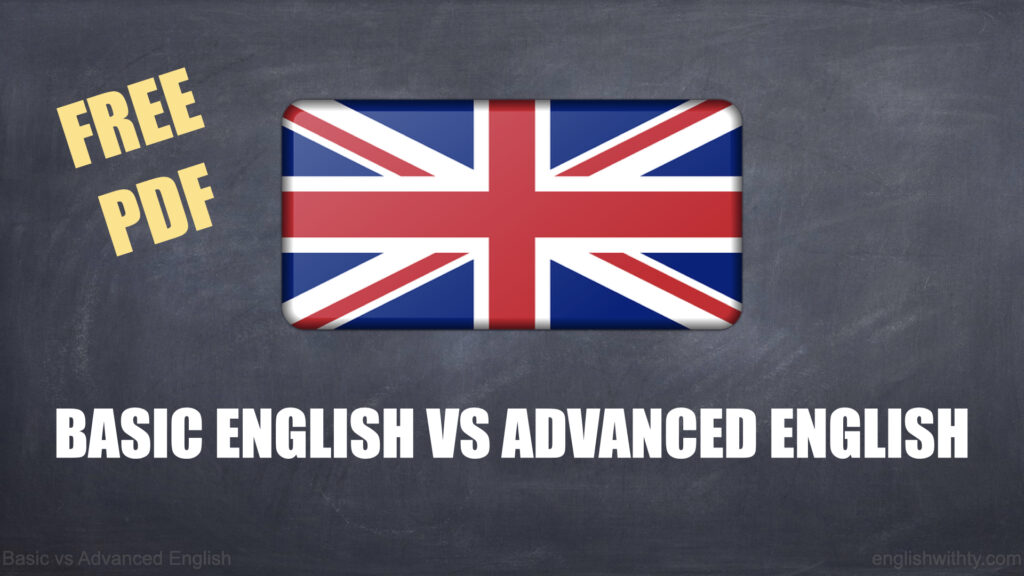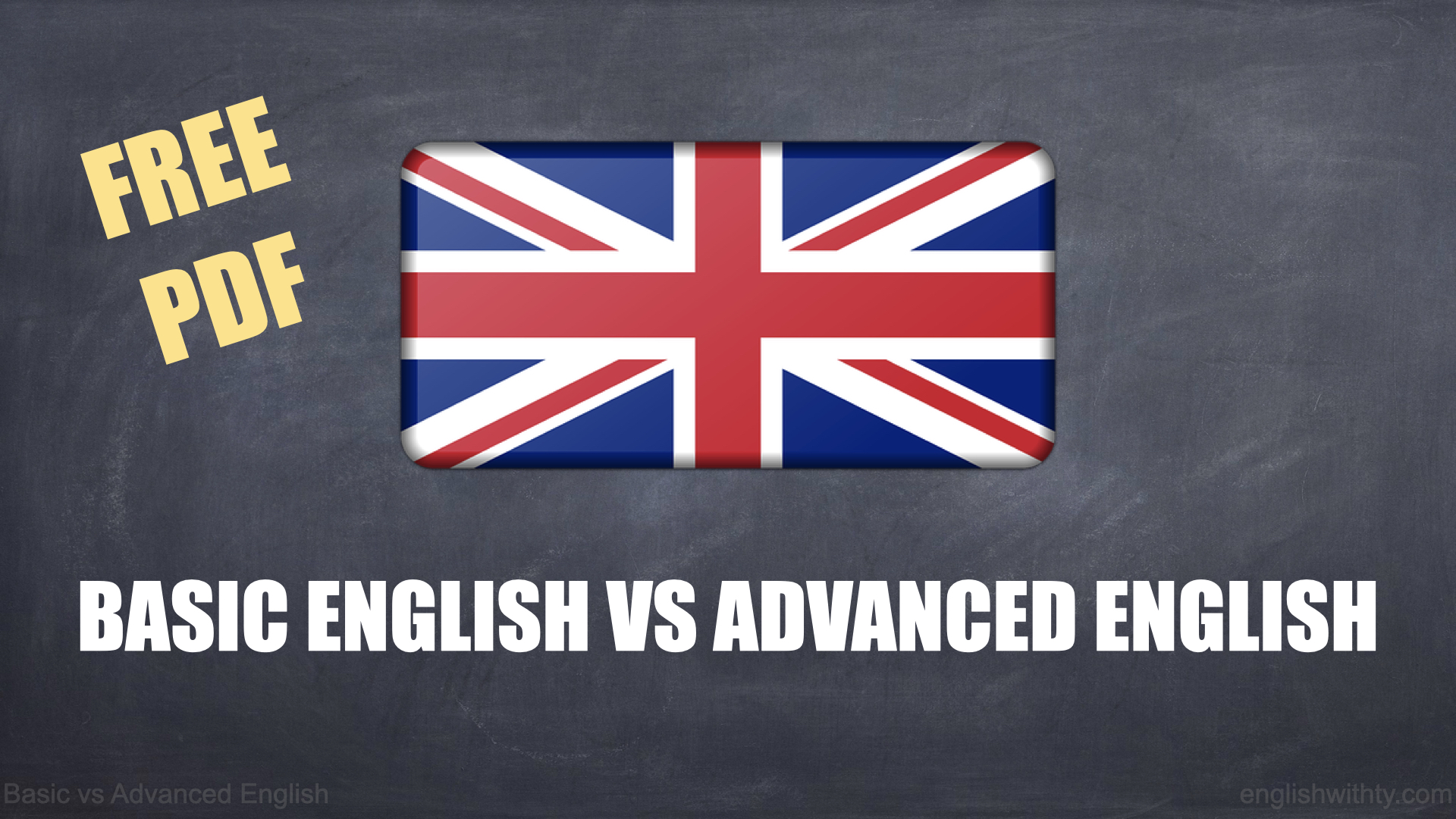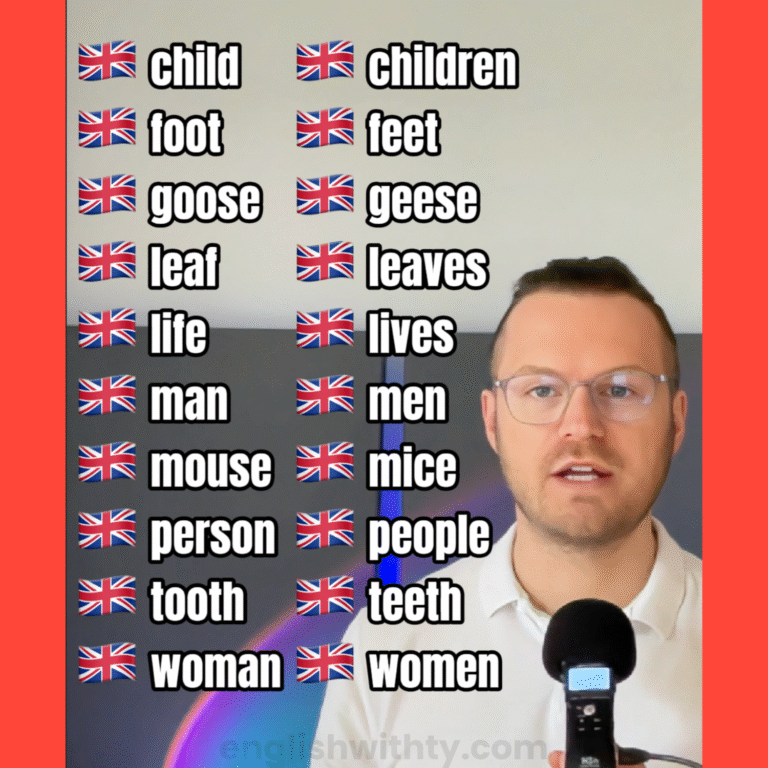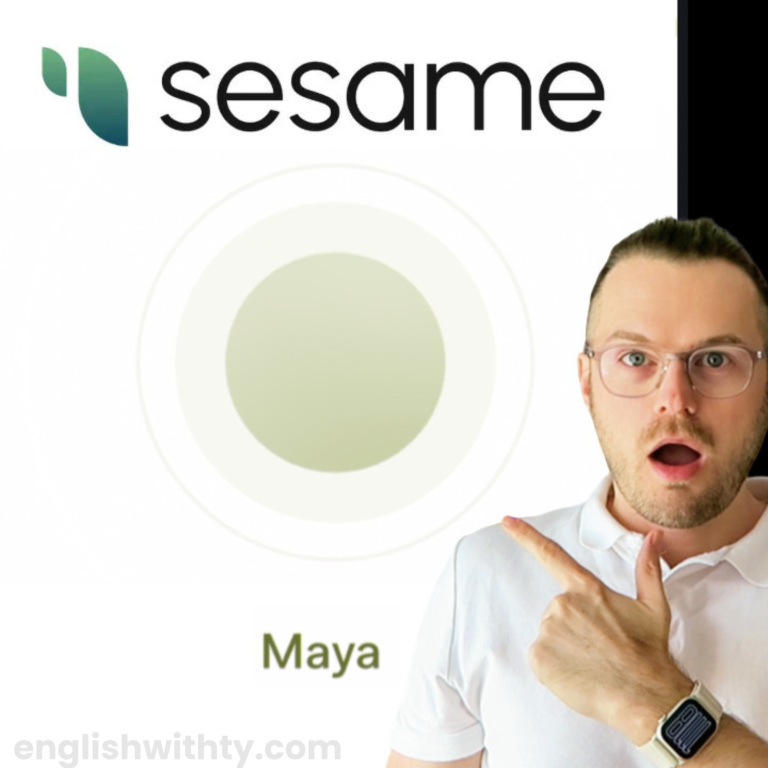Mastering Basic vs Advanced English vocabulary is a crucial step toward fluency, but many learners, especially German speakers, face unique challenges when transitioning from basic to advanced English. While some advanced words have direct German equivalents—like miserable (miserabel) or enormous (enorm)—others can be deceptive, leading to false friend mistakes that cause confusion.
Understanding the difference between basic and advanced English is essential for improving communication skills, whether in casual conversations, academic writing, or professional settings. While basic vocabulary helps with everyday interactions, advanced words add precision, sophistication, and nuance to speech and writing.
In this guide, we’ll explore 100 examples of basic vs. advanced English words, with a special focus on the common struggles European learners face. These examples will help you expand your vocabulary, avoid common mistakes, and sound more natural in English. Download the FREE PDF here. You can also watch the YouTube video below to hear the correct pronunciation of each word and see an example from a famous movie or show.
Understanding Basic vs Advanced English
English vocabulary can be divided into basic and advanced levels, depending on how words are used in different contexts. While basic English consists of simple, everyday words that are easy to understand, advanced English includes more precise, formal, and nuanced vocabulary.
What Makes English “Basic” or “Advanced”?
• Basic English uses common, frequently spoken words that are easy to learn and understand. These words are often used in daily conversations and are ideal for beginners. (Example: “big” instead of “enormous”)
• Advanced English includes more complex words, idiomatic expressions, and formal vocabulary. These words allow for greater accuracy and depth in communication. (Example: “require” instead of “need”)
Why German (and European) Learners Struggle with Vocabulary Differences
German (and European) learners often face challenges when upgrading their English vocabulary due to:
- False Friends – Words that look or sound similar in German and English but have different meanings. (Example: “actually” in English vs. “aktuell” in German, which means “currently”)
- Cognates with Different Formality Levels – Some words exist in both languages but have different levels of formality. (Example: “miserable” means “unhappy” in English but can mean “poor quality” in German.)
- Direct Translations That Sound Unnatural – While German and English share many words, direct translations don’t always work in real conversations. (Example: “become” does not mean “bekommen” (to receive) in German.)
By understanding these key differences, German learners can avoid common mistakes, improve fluency, and use English vocabulary more effectively in both casual and professional settings.
Basic vs Advanced English: 100 Examples
| Basic English | Advanced English |
|---|---|
| Very big | Enormous |
| Very small | Tiny |
| Very happy | Ecstatic |
| Very sad | Miserable |
| Very fast | Swift |
| Very slow | Sluggish |
| Very easy | Effortless |
| Very hard | Challenging |
| Very scared | Terrified |
| Very angry | Furious |
| Very smart | Brilliant |
| Very tired | Exhausted |
| Very hungry | Starving |
| Very cold | Freezing |
| Very hot | Boiling |
| Very pretty | Gorgeous |
| Very ugly | Hideous |
| Very funny | Hilarious |
| Very strong | Powerful |
| Very weak | Fragile |
| Nice | Pleasant |
| Mean | Malicious |
| Very Important | Crucial |
| Rich | Wealthy |
| Very poor | Destitute |
| Very clean | Spotless |
| Very dirty | Filthy |
| Friendly | Amiable |
| Rude | Impolite |
| Strange | Bizarre |
| Lazy | Indolent |
| Busy | Occupied |
| Quiet | Silent |
| Very Loud | Deafening |
| Bright | Luminous |
| Dark | Gloomy |
| Difficult | Arduous |
| Old | Ancient |
| New | Innovative |
| Help | Assist |
| Walk | Stroll |
| Look | Glance |
| Buy | Purchase |
| Talk | Discuss |
| Think | Contemplate |
| Give | Donate |
| Start | Commence |
| End | Conclude |
| Use | Utilise |
| Keep | Preserve |
| Break | Shatter |
| Build | Construct |
| Need | Require |
| Try | Attempt |
| Fix | Repair |
| Show | Demonstrate |
| Choose | Select |
| Hide | Conceal |
| Call | Summon |
| Say | Declare |
| Ask | Inquire |
| Leave | Depart |
| Stop | Cease |
| Fight | Combat |
| Eat | Consume |
| Sleep | Slumber |
| Throw | Toss |
| Laugh | Chuckle |
| Cry | Weep |
| Begin | Initiate |
| End | Terminate |
| Fall | Plummet |
| Rise | Ascend |
| Love | Adore |
| Hate | Despise |
| Win | Conquer |
| Lose | Forfeit |
| Wait | Linger |
| Change | Modify |
| Move | Shift |
| Hold | Grasp |
| Drop | Release |
| Pull | Yank |
| Push | Propel |
| Run | Sprint |
| Jump | Leap |
| Sit | Perch |
| Stand | Rise |
| Touch | Graze |
| See | Observe |
| Hear | Perceive |
| Smell | Scent |
| Taste | Savor |
| Feel | Sense |
| Walk | Saunter |
| Write | Compose |
| Read | Examine |
| Learn | Absorb |
| Remember | Recall |

How to Improve Your Vocabulary
Expanding your vocabulary from basic to advanced English takes consistent practice and the right strategies. Here are some effective methods to help you upgrade your word choices and sound more fluent:
• Shadowing Technique with Videos and Shows – One of the best ways to improve pronunciation and vocabulary is by shadowing—listening to a native speaker and repeating what they say in real time. Watch my videos on English with Ty and practice speaking along with me to train your brain to use advanced vocabulary naturally. You can also watch Netflix shows and movies. Here are the 20 Best Series for Learning English.
• Read More Complex Texts – Engage with news articles, books, and blogs that use advanced vocabulary in context. Pay attention to new words and how they’re used in different situations.
• Use a Thesaurus & Learn Synonyms – Instead of relying on basic words like good or bad, use a thesaurus to discover stronger and more precise alternatives.
• Practice with Flashcards & Word Associations – Apps like Anki or Quizlet can help you memorise advanced words more effectively. Try linking new words to their German equivalents or creating mental images to remember them.
• Speak with Native Speakers – The more you practice speaking in real conversations, the more natural your vocabulary will become. Language exchange platforms like Tandem or HelloTalk can help you connect with native English speakers.
By practicing regularly, shadowing YouTube videos, and exposing yourself to advanced English, you’ll upgrade your vocabulary and speak more fluently in no time!
Conclusion
Mastering the difference between basic and advanced English is a key step toward fluency and confidence in communication. By expanding your vocabulary, you can sound more natural, express yourself more precisely, and avoid common mistakes—especially if you’re a German learner dealing with false friends and formal differences between the two languages.
The best way to improve is through consistent practice. Whether it’s reading advanced texts, using a thesaurus, practicing with flashcards, or shadowing my videos on English with Ty, every small effort helps you move toward more fluent and sophisticated English.
With dedication and the right learning strategies, you’ll be able to upgrade your vocabulary, speak with confidence, and communicate like a native. Keep practicing, and don’t be afraid to challenge yourself with new words and phrases.
Sign up to my Newsletter to get the free PDF documents, updates and more to improve your English ⬇️




